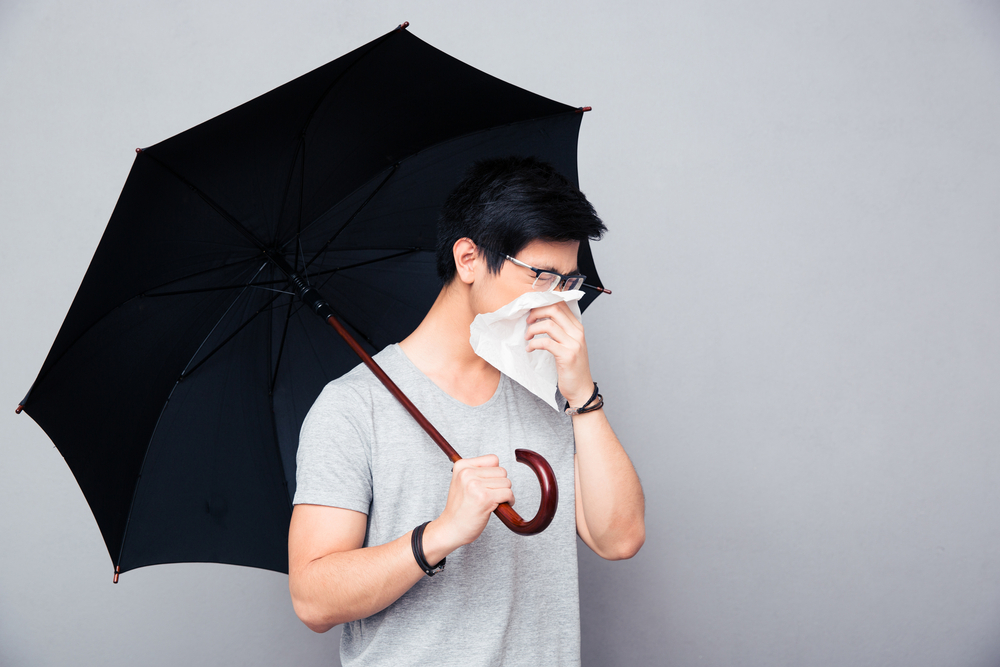Medical Myths: Can You Get Sick from Being in the Rain?
Cold & Flu
•
Jan 26, 2022
Reviewed by:

The experts at Complete Care are here to crack a very common medical myth: Can you get sick from being in the rain? As a child, you may have heard adults tell you not to stay out in the rain too long or else you’ll catch a cold.
Contrary to popular belief, being out in the rain does not automatically make you sick. While the rain itself does not make you sick, it does play a role in how you could catch an illness. Similar to our advice for popular winter health tips, wearing layers of warm clothing and carrying an umbrella can help prevent you from getting drenched in the rain and avoid getting sick.
So, if rain does play a part, can you get sick from being in the rain? Let’s talk about it.
How being in the rain CAN make you sick
If you believe you have caught a cold or some other type of illness after being in the rain, you may be quick to blame the cold, rainy weather. As mentioned earlier, the rain itself is not responsible for making you sick, but it may have increased your risk of being exposed to an illness for the following reasons.
Lowered body temperatures
Cold and rainy weather lowers our body temperature, which can weaken our immune systems and allow us to fall ill easier. It also can increase your risk of infection and make it more difficult for your body to fight the infection off. Extremely cold temperatures can also make us more susceptible to serious illnesses like hypothermia –– a serious condition where the body loses more heat than it can make.
Low humidity
Why is it that most people fall ill during cold and rainy months? The truth is, airborne bacteria and viruses can survive longer in low humidity environments, increasing your likelihood of you getting sick. This is why the common cold and flu are the most common illnesses to catch during the winter due to the high levels of bacteria and viruses floating around in the air. Is the common cold caused by bacteria?Similar to sinus infections and pneumonia, bacteria and viruses are the main culprits for common illnesses.
Keep reading: Does cold weather make your muscles ache?
How to avoid getting sick in the rainy season
Though the rain is not solely responsible for your sniffly nose and scratchy throat, there are still ways to prevent illness when it is cold and rainy outside. After all, especially in winter, it is crucial that you and your family are practicing tips for staying healthy during flu season to avoid catching illnesses when possible.
- Wear warm layers: Cold weather can cause our bodies to release heat more quickly, making us more susceptible to illnesses and hypothermia. As a prime winter health tip, bundling up with layers will help you to keep warm and lessen the risk of sickness.
- Carry an umbrella: Avoid getting wet while out in the rain if possible by carrying an umbrella and seeking shelter promptly. As a literal shield against the rain, an umbrella will keep you dry and in turn, will help better regulate your body temperature so that you can stay warm.
- Avoid sick individuals: Airborne bacteria and viruses are the main culprits for getting sick during the cold and rainy season. If you can, try to avoid others who may be sick and continue practicing proper hygiene by thoroughly washing your hands and using hand sanitizer to keep germs at bay.
Keep reading: How to keep from getting sick while traveling.
Avoid and treat illnesses with help from Complete Care
Though singing in the rain sounds fun in theory, it may not be the best activity for your immune system. Consider the medical myth behind the question “Can you get sick from being in the rain?”debunked! With all of the above in mind, we hope that you are better equipped to defend yourself against illness during the cold and rainy season.
If you find yourself showing symptoms of more severe conditions like hypothermia including excessive shivering, memory loss, slurred speech, and drowsiness, head to a Complete Care emergency room as soon as possible. With many ER locations all across Texas (including the Dallas/Fort Worth area) and Colorado, our highly trained medical staff is well-versed in how to treat hypothermia.
More Helpful Articles by Complete Care:
